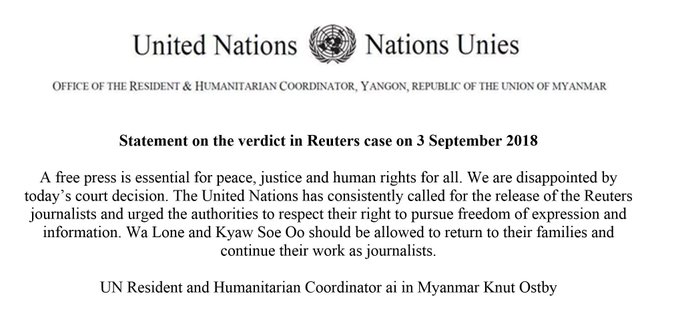A court in Myanmar has sentenced two Reuters journalists to seven years in prison for violating a state secrets act while investigating violence against Rohingyas.
Wa Lone and Kyaw Soe Oo were arrested while carrying official documents which had just been given to them by police officers.
They have maintained their innocence, saying they were set up by police.
The case has been widely seen as a test of press freedom in Myanmar.
“I have no fear,” Wa Lone, one of the two journalists, said after the verdict. “I have not done anything wrong. I believe in justice, democracy and freedom.”
The two men, who both have families with young children, have been in prison since their arrest in December 2017.
“Today is a sad day for Myanmar, Reuters journalists Wa Lone and Kyaw Soe Oo, and press freedom anywhere,” said Reuters editor-in-chief Stephen Adler.
Judge Ye Lwin told the court in Yangon the pair had “intended to harm the interests of the state”.
“And so they have been found guilty under the state secrets act,” he said.
Wa Lone, 32, and Kyaw Soe Oo, 28, had been collecting evidence about the execution of 10 men by the army in the village of Inn Din in northern Rakhine.
During their investigation, they were offered documents by two police officers, but were arrested immediately afterwards for the possession of those documents.
Authorities later launched their own probe into the killings, confirming the massacre took place and promising to take action against those who had taken part.
‘A crushing blow to freedom’
Nick Beake, BBC Myanmar correspondent, Yangon
Wa Lone and Kyaw Soe Oo bowed their heads as the verdict was delivered while their families broke down in tears in court.
The reporters have always insisted they were framed. Wa Lone – who missed the birth of his first child while being detained – protested his innocence once again as he was led away.
Many will see this verdict as a crushing blow to freedom of the press in Myanmar and another setback for democracy, three years after Aung San Suu Kyi’s party triumphed in free elections.
Last week, UN inspectors called for Myanmar’s top generals to stand trial for genocide for the crimes committed against the Rohingya – the very subject these reporters were investigating.
‘Deeply troubling verdict’
“We are extremely disappointed by this verdict,” Britain’s ambassador to Myanmar, Dan Chugg said according to Reuters.
US ambassador Scot Marciel echoed the same criticism, saying the court’s decision was “deeply troubling for everybody who has struggled so hard here for media freedom”.
The UN’s resident and humanitarian co-ordinator in Myanmar Knut Ostby said the UN had “consistently called for the release” of the journalists and that “a free press is essential for peace, justice and human rights for all. We are disappointed by today’s court decision”.
“The outrageous convictions show Myanmar courts’ willingness to muzzle those reporting on military atrocities,” Brad Adams, Asia director at Human Rights Watch, said.
“These sentences mark a new low for press freedom and further backsliding on rights under Aung San Suu Kyi’s government.”
The verdict had been delayed once because of the judge’s ill health.
The ruling comes a year after the crisis in Rakhine state came to a head when a Rohingya militant group attacked several police posts.
The military responded with a brutal crackdown against the Rohingya minority.
Media access to Rakhine is strictly controlled by the government so it is difficult to get reliable news from the region.


